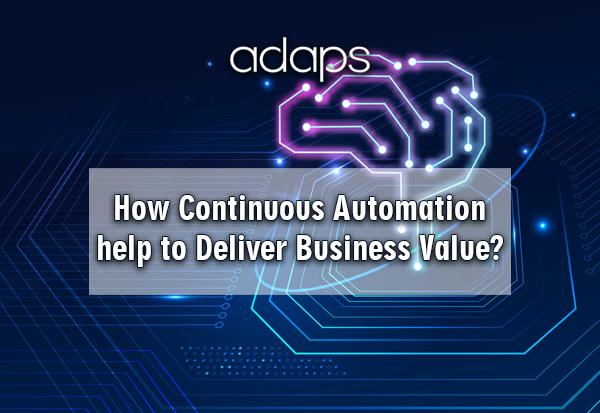DevOps is neither a tool/technology nor a framework. It is a software development strategy which bridges the gap between development and Operations team of the company. There are lots of conflicts between Development and operations team for instance the software works in Developers system but don’t work well in production environment. Similarly Developer wants Agility but operations team wants stability. There are many such conflicts which give rise to a concept called as DevOps which helps in resolving these problems.
Continuous Automation and DevOps
DevOps can be implemented and comprehended only with the help of Continuous Automation. Continuous Automation plays an important role in implementing DevOps at various stages of application life cycle. Continuous Automation is a practice to automate an application at every stage of software development and testing life cycle.
It helps in building, integrating , deploying software changes at a faster pace maintaining the consistency and security of the application. It integrates automation of infrastructure and applications, and helps in managing the version control of the software product. It allows to test a particular application under multiple test environments and conditions thereby helping to manage the software product efficiently. With the traditional testing approaches , it becomes difficult to drive the business in continuous delivery mode.
Automation at every and early stages of testing life cycle ensures validations of whether software meets business demands and expectations and clears every quality gate in the delivery pipelines. There are lots of benefits delivered through continuous automation in terms of speed, efficiency and business risk to the customer.
Lets have a closer look on how incorporating Continuous Automation helps in adding value to DevOps at every stage in application management life cycle.
Continuous Development
Software Project Planning plays a very important role in DevOps methodology. Project Planning is done on the basis of software requirements and its business needs. Once the project planning is completed, development and implementation of the code is then kicked off. Developers develop the code on the existing code and keep amending the code based on the continuous feedback and various operational methods using various automations tools and technologies as per the application needs and demands.
Continuous Integration
The continuous integration is a process where the developed code is merged into a single central repository in a continuous format. This helps in maintaining a single version of the copy across development and operations team. Developer merges the code with help of continuous integration tools like Jenkins, Maven, Git/gerrit. Once the code is merged in the repository it triggers an automatic compilation, builds and executes the code. This helps the developer in detecting the broken code at the early stage.
Continuous Testing
Continuous testing means undisrupted testing during integration phase. Once the build is deployed on the server, regression testing is conducted with the help of automated tools like selenium, UFT and other automation tools to check the impact of the code. Automation batches are kicked off automatically through the CI/CD tools and the summary results are then generated in the report logs. Continuous testing helps in achieving shorter time to market.
Continuous Monitoring
This is an operational phase of DevOps, where the user actions of the customers are recorded and trend analysis is carried out to improve the efficiency and capabilities of the software application.
Various monitoring methods are performed under this stage like shift left testing, web services testing, early defect detection, micro services testing and many others through automation to eliminate errors at an early stage.
Continuous Feedback
Continuous feedback of the application is provided to the developer with the help of customer’s surveys, feedbacks and other ways through which application can be improvised. These feedbacks aim in delivering the best of product to the customer. Feedbacks are in an iterative mode so that continuous development on the flaws of the application is worked upon by the developers and tested by the testers.
Conclusion:
User needs are changing rapidly , and meeting the business demands seems more and more tougher everyday . The best way to achieve this is to drive the assets directly from the initial phase itself. This is only possible with the help of continuous automation in DevOps.
DevOps is a best way for software development. It definitely eradicates the gap between development and operation teams and engages more iterative way of testing. DevOps will capture the market in the growing time and will evolve as the best practice to develop dynamic applications and overcome all challenges.
DevOps offerings in Adaps
As the scope of development of the applications keeps increasing, the need for DevOps to reduce time to market will keep increasing as well. Adaps focuses and helps in delivering a quality product to the customer by using high end technologies which helps in collaborating effectively with developers and Operations team. We have wide range of frameworks, tools and technologies like
Cucumber framework, Apache, Maven, Jenkins, SOAP UI, ALM and others which will help in transforming your business to DevOps.
We value and understand the need to move faster and Go Digital. We will help you in accelerating your business and increase your ROI.
If DevOps is your need then hold on to this page and collaborate with us for end to end implementation of DevOps.


